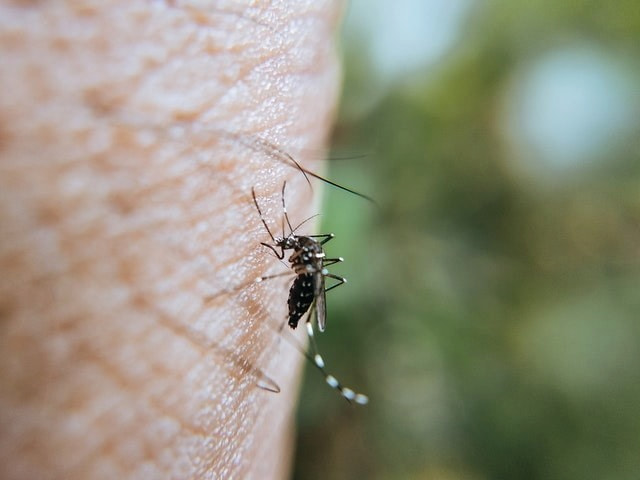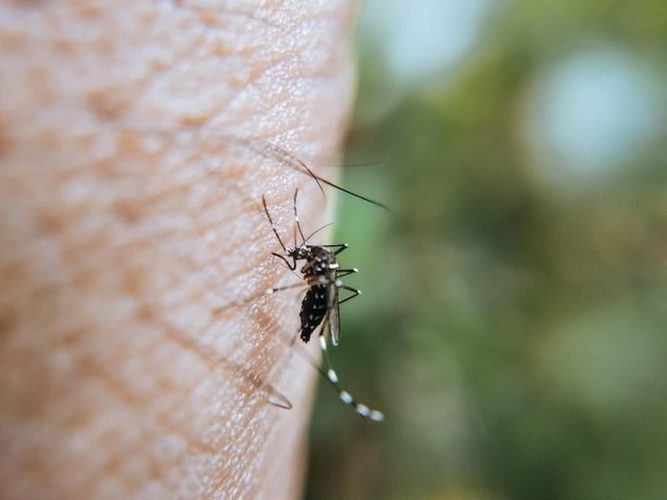We are slowly entering summer, and mosquitoes come with it. And while these blood-sucking insects are annoying to most people, they can sometimes cause an allergic reaction, also known as Skeeter Syndrome.
Skeeter syndrome is a condition newly recognized by the medical community and was first recorded in a 1999 study published in the Journal of Allergy and Clinical Immunology. The study described five otherwise healthy children, ages 2 to 4, who were sent to an allergy clinic after being diagnosed by different primary care physicians with a severe bacterial skin infection that developed within hours of being bitten by a mosquito.
The children had different reactions, including one whose face was covered with a red rash and whose eye was swollen for a week after being bitten by a mosquito.
A female mosquito locates its prey using a combination of human odor, exhaled carbon dioxide, and chemicals in a person’s sweat. When it finds the right person, it rests on the exposed skin and inserts its proboscis into the epidermis to suck blood. The proboscis is a long, flexible tube located on the mosquito’s head that can pierce human skin. The common symptoms—a red, raised mass and itching—are not caused by the sting itself, but by the immune system’s reaction to the mosquito saliva proteins. This reaction is known as Skeeter syndrome.
Skeeter syndrome, the researchers concluded, is an allergic reaction to the proteins in mosquito saliva. Patients are particularly sensitive to the sting and often have a fever. Skeeter syndrome is usually annoying, but not life-threatening.

How long does Skeeter syndrome last?
Each person’s reaction is different, but the symptoms usually last for three to five days. Most people have some level of allergy to mosquito saliva, but it is more common in people with this syndrome, and this can cause a difference in reactions.
Usually, when mosquitoes bite us, we have a small red lump. But those with Skeeter syndrome will experience more itching, fever, and difficulty breathing.
How to prevent it
The best way to prevent Skeeter Syndrome is to avoid stings. To this end, patients with the syndrome should take appropriate measures each time they go out, such as:
- Wear long pants and long sleeves to minimize the surface of the skin exposed to the stings.
- Wear a scarf to protect the neck.
- Use insect repellent spray regularly.
- Use other methods to remove mosquitoes, such as candles and bracelets with citronella.
- Do not wear light-colored clothing, as it attracts mosquitoes.
- Avoid areas with stagnant water.
- Do not use strong perfumes.
- Patients with severe reactions should also avoid going outside during the hours when mosquitoes are most active, i.e., from sunset to sunrise.
How is Skeeter Syndrome treated?
There is virtually no diagnostic test for Skeeter syndrome, which means that there is no blood test that can detect mosquito antibodies. Thus, a mosquito allergy is diagnosed by your symptoms.
There are a variety of treatment options for patients with Skeeter syndrome, from simple treatments to more complex medical treatments:
- Ice
For stings that react to a small area of skin, start with the simplest form of treatment. Lift the limb at which the sting is located and apply an ice pack to reduce inflammation, pain, and itching, as well as redness.
- Antihistamines
If no improvement is seen with the above approach, over-the-counter medications may be used. For example, antihistamines such as diphenhydramine may temporarily reduce itching and swelling.
- Topical Steroids
Some topical corticosteroid creams may also temporarily relieve the symptoms of the sting. Medications such as hydrocortisone are quite effective in most cases.
If you have severe reactions to mosquito bites and are not relieved by the above creams, your doctor may prescribe stronger medications.
Finally, if you suspect you have Skeeter Syndrome, it is a good idea to take extra precautions to protect yourself from mosquito bites. And, as this affects your quality of life, it’s time to visit an allergist.

